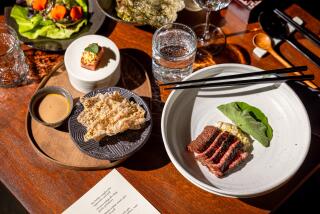King of the Road
My idea of traveling hobo-style is being forced to fly economy class on a trip to New York.
Freezing in a boxcar and eating dog-meat stew by the railroad tracks has never tempted me as a way of life, either on a temporary or permanent basis.
I rarely travel in a public conveyance that doesn’t serve martinis and I don’t dine on anything that once barked. That includes seals.
However, I do understand the lure of the road shared by those with names like Fishbone, Guitar (I mean Gittar) Whitey and Gas Can Paddy.
They were, or are, hobos, and to them heading somewhere, anywhere, is a temptation they can’t resist.
Trains clickety-clack through their dreams. Steam whistles enribbon their lives.
They like nothing better than to hunker down around an open fire at a hobo jungle somewhere between L.A. and Britt, Iowa, and sing about Tucson Red Rose, a legend of a lady who once rode the rails.
But, I hear you ask, if they long so for mulligan stew and dandelion root coffee, what’re they doing in a Beverly Hills restaurant God knows how far from lonesome whistles and clickety-clacks?
Good question.
To begin with, the appropriately named Roadhouse Restaurant is the meeting place once a month of the L.A.-based National Hobo Assn.
Unlike most Beverly Hills bistros, it’s a friendly, noisy Italian place frequented by real people. You’re not likely to find Swifty Lazar dining quietly in a corner with Kim Basinger.
What lured me to a meeting there the other night was the introduction of Hobo Soup.
It similarly lured the king and queen of hobos, John (Songbird) McCue and Jackie (Gypsy Moon) Schmidt.
A full-bearded grizzly bear of a man at 6-2 and 270 pounds, McCue traveled all the way from Bangor, Wis., by conventional means to introduce the soup in Beverly Hills.
He spent about 15 years riding the rails himself and says it was women who put him on the road in the first place.
“Broken romances are more responsible for hobos than anything else,” he said as we sat in a corner of the Roadhouse. “I’ve been divorced three times and workin’ on No. 4.”
McCue drank prodigious amounts of beer as we talked, and when I asked if he had a drinking problem, he said, “Not as long as I’ve got money.” His laugh rattled windows in Culver City.
Jackie Schmidt lives in Carmel, Ind. She never has ridden the rails but her dad hoboed for 17 years and she’s . . . well . . . a hobophile.
A matronly lady with a stylish sidesweep hairdo, Schmidt believes hobos, like cowboys, should occupy a special place in American folklore.
“We’re trying to preserve the hobo spirit,” she was saying, looking resplendent in overalls adorned with gold stars and quarter moons. “We want people to know happiness isn’t a destination, but a way of getting there.”
“Being a hobo is being free,” McCue said. “Take off, man. Just go!”
Guys like Santa Fe Bobb and Captain Cook agreed. We’re all victims of a workaday world, they said. Our lives are structured by technology.
Then Hobo Fred, who’s got a Ph.D. in economics, sang about Tucson Red Rose. I began to hear the clickety-clacking. . . .
About the soup. It’s canned and distributed out of a place in Minnesota called Ortonville, which you are not likely to have heard of before. It isn’t listed in most travel guides.
Hobo Soup is made out of beans, potatoes, turnips and a lot of other things. A newspaper reporter created the recipe after spending time writing about what Steinbeck called “the last free men.”
There’s no meat in it, by the way, so you don’t have to worry about eating someone’s poodle.
McCue tells me they don’t eat dog anyhow. They try to set up their jungles near water and throw a lot of fish food into the pot.
Sometimes they’ll appropriate a lost chicken or kill wild game, but never jack rabbits.
“Jack rabbits have worms,” McCue said. “Nobody wants worms.”
Hobos, they’ll tell you, aren’t bums. They’ll work. That’s what makes them different from most of the homeless people today, McCue said. A hobo may be homeless, but a homeless person isn’t necessarily a hobo.
Hobo Soup isn’t too bad, I guess. I bought some because the proceeds benefit old hobos about to hop their last train to the jungle in the sky. It won’t replace vichyssoise but it’s edible.
There was the smell of rain in the air when I left the Roadhouse. I savored it for a moment, and then went on my way.
As I left, I thought I heard a sound coming from the restaurant. It said, clickety-clack, clickety-clack. . . .
More to Read
Sign up for The Wild
We’ll help you find the best places to hike, bike and run, as well as the perfect silent spots for meditation and yoga.
You may occasionally receive promotional content from the Los Angeles Times.





